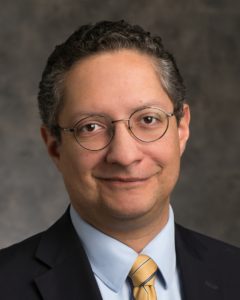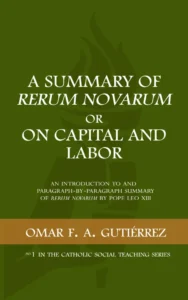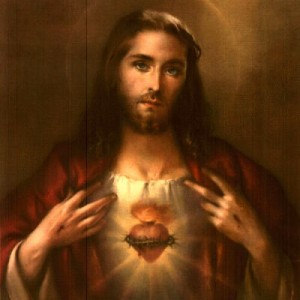Podcast: Play in new window | Download (Duration: 28:38 — 19.7MB) | Embed
Subscribe: Apple Podcasts | Spotify | Amazon Music | Android | Pandora | iHeartRadio | JioSaavn | Podchaser | Gaana | Podcast Index | Email | TuneIn | Deezer | Anghami | RSS | More

Corpus Christi Sunday- Building a Kingdom of Love with Msgr. John Esseff
Msgr. John Esseff and Kris McGregor discuss the significance of the Feast of Corpus Christi, emphasizing the profound importance of the Eucharist in the Catholic faith. Msgr. Esseff reflects on a beautiful morning where nature itself seemed to glorify the Trinity. He explains how the celebration of the Eucharist is a re-presentation of Christ’s sacrifice on Calvary and that every Mass around the world continues this unbroken lineage from the Last Supper. The Eucharist is not just bread and wine but the actual body and blood of Christ. To recognize the real presence of Jesus in the Eucharist, we must deepen our faith and relationship with Him.
Msgr. Esseff shares personal experiences and anecdotes to illustrate the transformative power of the Eucharist and how it brings believers into an intimate union with Christ. The common neglect of the Eucharist, even among Catholics, and the importance of Eucharistic adoration and frequent reception of Communion calls us to a renewed devotion to the Eucharist and its significance as a source of eternal life and divine love.
From the Gospel of St. John, Chapter 6
“The next day, the crowd that remained across the sea saw that there had been only one boat there, and that Jesus had not gone along with his disciples in the boat, but only his disciples had left. Other boats came from Tiberias near the place where they had eaten the bread when the Lord gave thanks. 24 When the crowd saw that neither Jesus nor his disciples were there, they themselves got into boats and came to Capernaum looking for Jesus. And when they found him across the sea they said to him, “Rabbi, when did you get here?” Jesus answered them and said, “Amen, amen, I say to you, you are looking for me not because you saw signs but because you ate the loaves and were filled. Do not work for food that perishes but for the food that endures for eternal life, which the Son of Man will give you. For on him the Father, God, has set his seal.” So they said to him, “What can we do to accomplish the works of God?” Jesus answered and said to them, “This is the work of God, that you believe in the one he sent.” So they said to him, “What sign can you do, that we may see and believe in you? What can you do? Our ancestors ate manna in the desert, as it is written:
‘He gave them bread from heaven to eat.’”
So Jesus said to them, “Amen, amen, I say to you, it was not Moses who gave the bread from heaven; my Father gives you the true bread from heaven. For the bread of God is that which comes down from heaven and gives life to the world.”
So they said to him, “Sir, give us this bread always.” Jesus said to them, “I am the bread of life; whoever comes to me will never hunger, and whoever believes in me will never thirst. But I told you that although you have seen, you do not believe. Everything that the Father gives me will come to me, and I will not reject anyone who comes to me, because I came down from heaven not to do my own will but the will of the one who sent me. And this is the will of the one who sent me, that I should not lose anything of what he gave me, but that I should raise it on the last day. For this is the will of my Father, that everyone who sees the Son and believes in him may have eternal life, and I shall raise him on the last day.”
The Jews murmured about him because he said, “I am the bread that came down from heaven,” and they said, “Is this not Jesus, the son of Joseph? Do we not know his father and mother? Then how can he say, ‘I have come down from heaven’?” Jesus answered and said to them, “Stop murmuring among yourselves. No one can come to me unless the Father who sent me draw him, and I will raise him on the last day. It is written in the prophets:
‘They shall all be taught by God.’
Everyone who listens to my Father and learns from him comes to me. 46 Not that anyone has seen the Father except the one who is from God; he has seen the Father. Amen, amen, I say to you, whoever believes has eternal life. I am the bread of life. Your ancestors ate the manna in the desert, but they died; this is the bread that comes down from heaven so that one may eat it and not die. I am the living bread that came down from heaven; whoever eats this bread will live forever; and the bread that I will give is my flesh for the life of the world.”
The Jews quarreled among themselves, saying, “How can this man give us his flesh to eat?” Jesus said to them, “Amen, amen, I say to you, unless you eat the flesh of the Son of Man and drink his blood, you do not have life within you. Whoever eats my flesh and drinks my blood has eternal life, and I will raise him on the last day. For my flesh is true food, and my blood is true drink. Whoever eats my flesh and drinks my blood remains in me and I in him. Just as the living Father sent me and I have life because of the Father, so also the one who feeds on me will have life because of me. This is the bread that came down from heaven. Unlike your ancestors who ate and still died, whoever eats this bread will live forever.” These things he said while teaching in the synagogue in Capernaum.
The Words of Eternal Life. Then many of his disciples who were listening said, “This saying is hard; who can accept it?” Since Jesus knew that his disciples were murmuring about this, he said to them, “Does this shock you? What if you were to see the Son of Man ascending to where he was before? It is the spirit that gives life, while the flesh is of no avail. The words I have spoken to you are spirit and life. But there are some of you who do not believe.” Jesus knew from the beginning the ones who would not believe and the one who would betray him. And he said, “For this reason I have told you that no one can come to me unless it is granted him by my Father.”
As a result of this, many of his disciples returned to their former way of life and no longer accompanied him.Jesus then said to the Twelve, “Do you also want to leave?” 68 Simon Peter answered him, “Master, to whom shall we go? You have the words of eternal life. We have come to believe and are convinced that you are the Holy One of God.”
Discerning Hearts Reflection Questions:
- How do I personally experience the presence of Jesus in the Eucharist during Mass?
- Do I truly believe that the bread and wine become the actual body and blood of Christ?
- How often do I receive Communion, and do I prepare myself adequately for it?
- How frequently do I spend time in Eucharistic adoration, and what is my attitude towards this practice?
- Do I ensure that the sick and homebound in my community receive the Eucharist regularly?
- Do I approach the Eucharist with reverence, or have I become indifferent to its significance?
- In what ways has the Eucharist transformed my life and deepened my relationship with Jesus?
- How can I better educate others about the significance of the Eucharist and encourage them to receive it with faith and reverence?
- How does understanding the historical continuity of the Eucharist from the Last Supper to today strengthen my faith?
- How do I contemplate and appreciate the sacrificial nature of the Eucharist during Mass?
Msgr. John A. Esseff is a Roman Catholic priest in the Diocese of Scranton. He was ordained on May 30, 1953, by the late Bishop William J. Hafey, D.D. at St. Peter’s Cathedral in Scranton, PA. Msgr. Esseff served a retreat director and confessor to St. Teresa of Calcutta. He continues to offer direction and retreats for the sisters of the Missionaries of Charity around the world. Msgr. Esseff encountered St. Padre Pio, who would become a spiritual father to him. He has lived in areas around the world, serving in the Pontifical Missions, a Catholic organization established by St. Pope John Paul II to bring the Good News to the world especially to the poor. Msgr. Esseff assisted the founders of the Institute for Priestly Formation and continues to serve as a spiritual director for the Institute. He continues to serve as a retreat leader and director to bishops, priests and sisters and seminarians, and other religious leaders around the world.

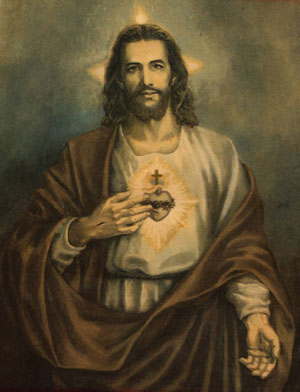
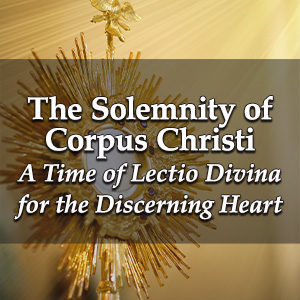 The Solemnity of Corpus Christi – A Time of Lectio Divina for the Discerning Heart Podcast
The Solemnity of Corpus Christi – A Time of Lectio Divina for the Discerning Heart Podcast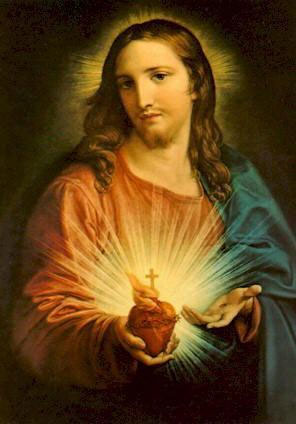
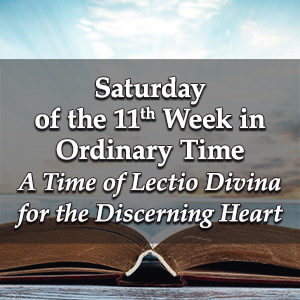 Saturday of the Eleventh Week of Ordinary Time – A Time of Lectio Divina for the Discerning Heart Podcast
Saturday of the Eleventh Week of Ordinary Time – A Time of Lectio Divina for the Discerning Heart Podcast
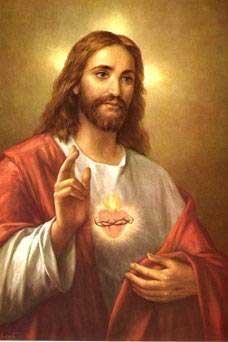
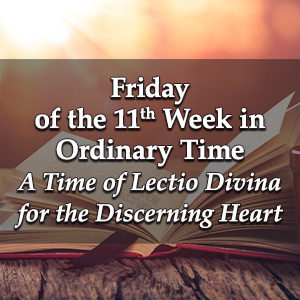 Friday of the Eleventh Week of Ordinary Time – A Time of Lectio Divina for the Discerning Heart Podcast
Friday of the Eleventh Week of Ordinary Time – A Time of Lectio Divina for the Discerning Heart Podcast